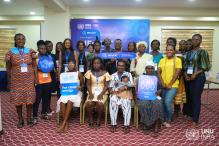After winning a sum of $7400 each in December 2024, 10 young INFoCAT Innovation Challenge winners have recently gone through a series of activities (field trips), with the INFoCAT Ghana team and experts in the agriculture and renewable energy sector. The aim of these trips is to help innovators fine-tune their innovations and manufacture these clean agritech machinery, to best suit the needs of smallholder farmers in communities involved in the INFoCAT project.
In the first phase of the field trips, (22nd- 24th January), the INFoCAT (Ghana) team visited smallholder farming communities across 3 regions in Ghana: Central, Eastern and Volta.
Each community engagement involved the introduction of innovators and their innovations to the farming communities. The farming communities also pointed out the challenges they faced in their farming processes. Inputs from farming communities was important to help the Ghana team and team of experts identify how to help the innovators develop their agritech solutions. The team sought to make these innovations more user friendly, efficient (reduce emissions, energy saving, quality processing), cost effective, and most especially, help reduce drudgery in farming activities.
The second phase of the INFoCAT field trip, was a follow up with innovators on the assembling and fine-tuning their innovations.
This phase of field trips took place from 13th-24th April 2025. The field trip started in the Ashanti and Bono Regions. The team visited an INFoCAT grantee DAS Biogas- that uses the waste from cassava processing to generate biogas. This gas is then used to power a biogas generator that provides electricity for other cassava processing machines and lighting for homes. Wobil Technologies, another promising group of young innovators with a strong female representation, received further coaching from experts on their rice winnowing machine. They were advised to consider motor sizing, efficiency in design and assembling a solar energy system with the right capacity to power the machine.
Other innovators visited include: i-Solar, a group with a smart solar powered irrigation system that monitors soil water content and automatically triggers a pump to irrigate a farm in the absence of the farmer. This group received a lot of coaching and mentorship from the expert team, around energy efficiency and automation.
Harvest Ease, another agritech company in Sunyani dedicated to creating small harvesters, which harvests and dehusks maize from its stalk, was also provided with hands-on design support during the visit. They were also advised on making their machinery more efficient and cost effective for farmers.
The team also visited Sunify innovators in Tamale, who are manufacturing a solar dryer that will have a heating and blower system that dries grains in about 6 hours, instead of the usual 5-7 sunny days.
Other agritech machines inspected in Greater Accra, Volta, Central and Eastern Regions include, a cassava peeling machine, a groundnut pod plucking/picking machine, a multi-fuel gari roaster/cookstove and an agro waste briquetting machine.
These inputs, especially from experts, has proven to be of great help to these innovators. The unique approach of having these experts provides hands-on training, mentorship and consistent guidance to these young innovators. This has gone a long way in helping them improve the productivity, efficiency and environmental impact of their machines.

The INFoCAT journey is not over. With these expert inputs and recommendations targeted at upgrading these agritech innovations, there still remains an opportunity for one of these young agritech innovators to win the final prize of $37,000 to expand their business.
The INFoCAT (Innovate for Clean Agricultural Technologies) project aims to advance the economic empowerment of both women and youth in rural areas of Ghana, Cote d’ivoire and Senegal. The project's objective is to promote low-cost, clean agritech solutions that increase agricultural productivity and income for smallholder farmers.
INFoCAT is sponsored by International Development Research Center (IDRC), Canada. Project partners include : ENDA Energie (Senegal) and Cote D’Ivoire ( UNU-INRA, Operating Unit).

